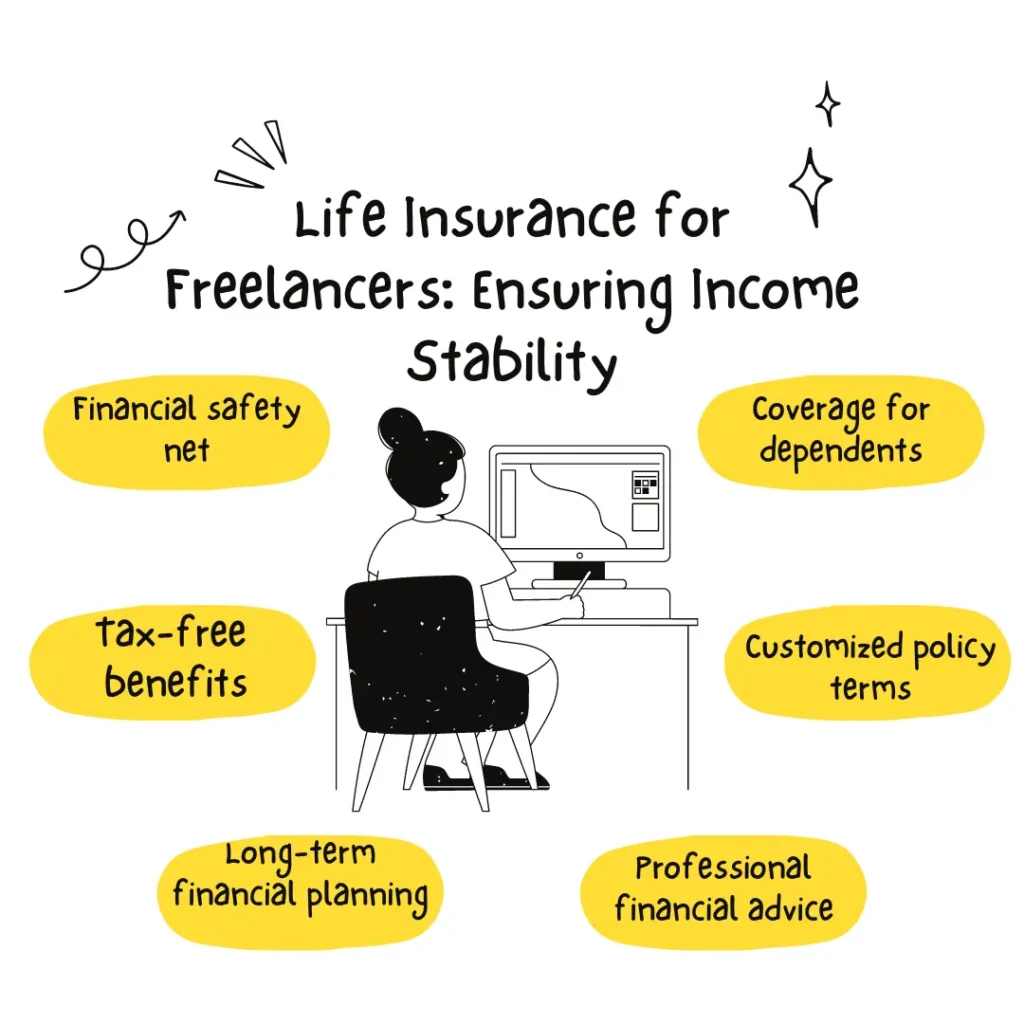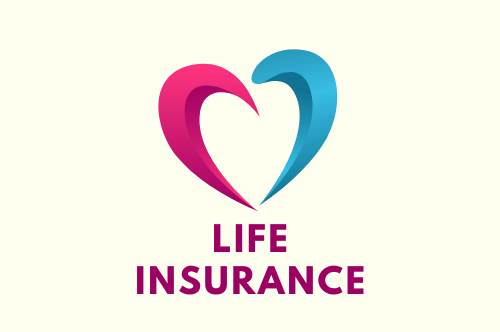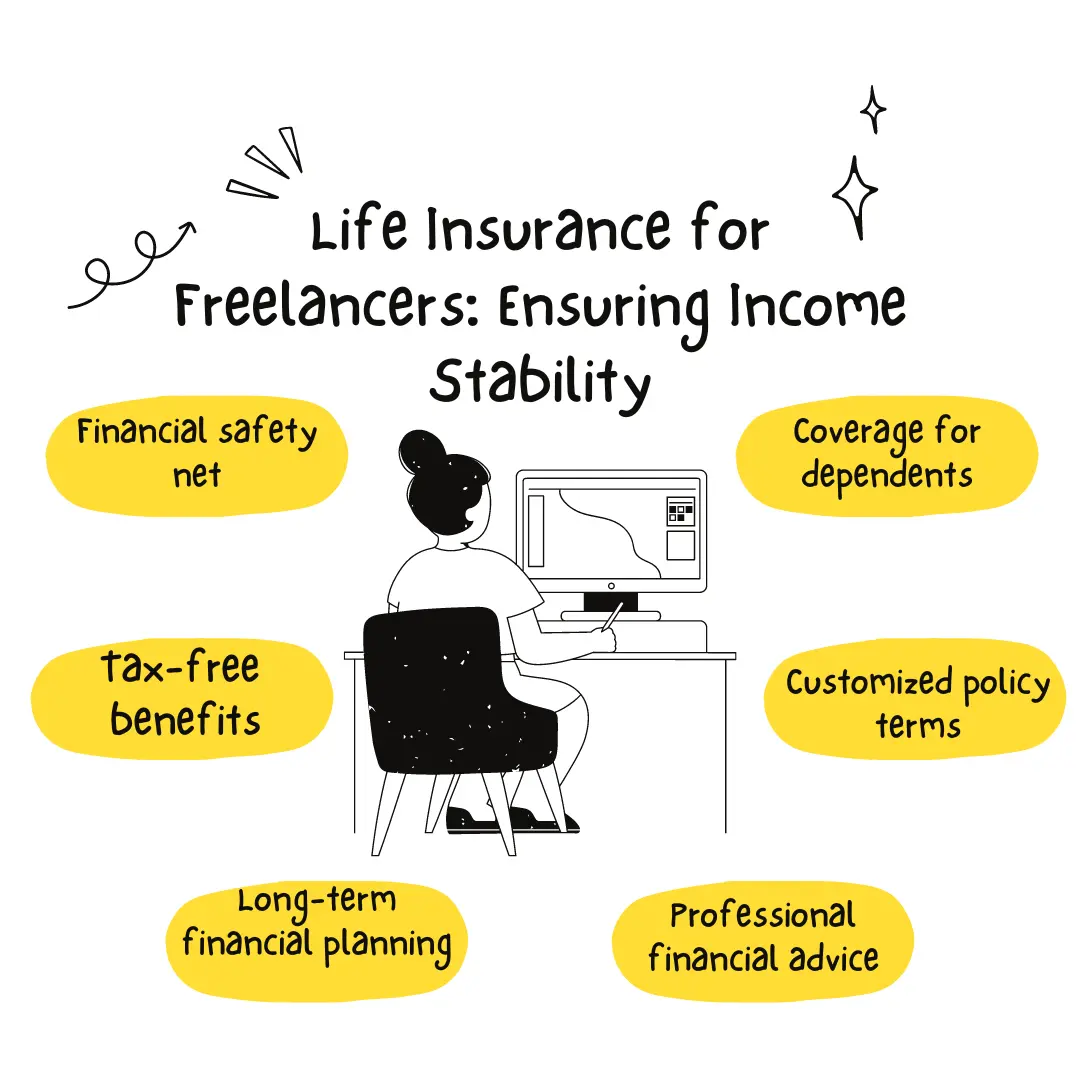Introduction
Freelancing enables people to organise their jobs around their interests. Financial and security hazards come with freedom. Freelancers cannot receive life, health, or retirement insurance. The essay discusses how freelancers need life insurance for financial security and peace of mind.
Understanding Life Insurance
Life insurance definition
A business or dependents need life insurance after death. Provides financial security for families and businesses. In exchange for premiums, insurance contracts pay beneficiaries upon death. Life insurance covers income replacement, debt repayment, funeral and final expenditures, and future financial obligations including children’s schooling and spouse retirement. Life insurance is needed for freelancers without perks. Financial obligations are satisfied without them.
Types of Life Insurance
Term or permanent life insurance is typical. Selecting the correct insurance requires understanding each type’s pros and cons.
1. Term Life Insurance
The term life insurance lasts 10–30 years. It covers the insured when they are most likely to have substantial financial commitments like raising children, paying off a mortgage, or paying for school.
Key Features
• Individuals choose coverage terms based on needs and money. Common terms are 10, 15, 20, and 30 years. Term life insurance is cheaper than permanent because it provides death benefit protection without financial value. Periodic premiums ease budgeting.
• Age and health may increase term insurance renewal prices. Many term insurance policies can be converted to permanent without medical underwriting. It helps policyholders with changing needs.
Pros, Cons
Pros: Less expensive than permanent life insurance. The simplified coverage protects important years financially. Flexible term lengths are dependent on financial obligations.
• Cons: Insurance offers only death benefits and no monetary value. Later in life, coverage may lapse. Reinstating coverage after the first time may raise prices dramatically.
2. Everlasting Life Insurance
Premium-paid permanent life insurance lasts forever. Plans offer death benefits and borrowable or withdrawn funds. Due to its cash value and lifetime coverage, permanent life insurance is useful for long-term financial planning.
Key Features
• Unlike term life, permanent plans cover a lifetime if paid. Makes recipients financially secure. Money in permanent life insurance increases tax-deferred. Death benefits may decrease with cash value borrowing or withdrawal.
Everlasting life insurance Offering whole and universal life insurance.
Whole Life Insurance: Fixed premiums, death benefit, cash value increase. Guaranteed cash value growth is reliable. Universal Life Insurance offers variable premiums and death benefits. Interest rate-driven cash value growth generates better returns but is more volatile.
Pros, Cons
Pros: Lifetime coverage protects beneficiaries after death. Cash value accumulation through savings or investments gives financial independence. Policies change premiums.
Cons: Higher rates than term life insurance may be costly. Early programming years may boost value. Withdrawals and loans lower death benefits and cost money.
3. Term vs. permanent life insurance
Cost worries
High-coverage workers pay less for term life. Low premiums make it affordable for all freelancers. Permanent life insurance costs more but provides lifetime coverage and an investment component for long-term financial planning.
Flexibility and Financial Goals
Freelancers seeking term or permanent life insurance should consider financial goals and flexibility. Simple, cheap-term life insurance is suitable for short coverage. Permanent life insurance offers lifetime protection and cash value growth.
Financial safety and risk tolerance
Investors with more risk and steady finances may choose permanent life insurance for cash value. However, term life insurance may fit basic, budget-conscious people.
Why Freelancers Need Life Insurance
Income Replacement
Due to intermittent income, freelancers need financial stability. Freelancer life insurance protects dependents by replacing income. Freelancers who support families need this.

Debt Repayment
Freelancers can start and run enterprises using equipment, office, and professional development loans. The freelancer’s heirs may inherit debts. Life insurance reduces family debt.
Company longevity
Small freelancers might use life insurance to operate. Examples include hiring temporary labor, paying off debts, and preparing the firm for sale or transfer.
Funeral and Final Costs
Families typically struggle with funerals and other last expenses. Life insurance may cover these payments during hard times.
How much life insurance do freelancers need?
Financial Obligations Assessment
Financial obligations must be assessed for life insurance requirements by independent contractors. Key elements are:
1. Current and Future Dependent Living Costs
Freelancers should estimate daily living costs for dependents. This includes accommodation, electricity, food, transportation, healthcare, and other recurring expenditures. Predict these costs for future dependents.
2. Business and personal debt
Life insurance evaluation must include all debts. Mortgages, vehicle loans, credit card debts, and business obligations that might hurt the family if repaid. Paying off debts may benefit the family.
3. Potential Child Education Costs
Life insurance should cover school fees, books, and more. Estimating these expenses helps low-income kids pay for school.
4. Funeral and Final Costs
A funeral may be expensive. Life insurance releases their dependents from financial burdens.
Estimate financial support length for income replacement
Freelancers should anticipate how long their family requires financial assistance before estimating income replacement demands. This phase may last years or decades, depending on dependents’ ages and other factors.
Annual Average Income twice
Double freelancers’ financial aid length by average yearly income. The algorithm calculates a death benefit baseline to meet family financial demands for the chosen time.
Considering Inflation
Check Rising Living Costs
Money’s buying value changes drastically with inflation. Plenty may not be enough tomorrow due to escalating living costs. Coverage must include inflation. Adjusting life insurance for inflation benefits dependents.
Life insurance choice
Freelancers’ financial objectives and circumstances influence term vs. permanent life insurance perks and downsides.
Term Life Insurance
Basic coverage, low pricing, excellent for transitory needs (mortgage payments, small children).
• Cons: No cash value, term-end coverage, and higher premiums.
Everlasting Life Insurance
Lifetime coverage, cash value growth, and savings/investment potential.
• Cons: High charges, complicated programs, not for all freelancers.
Insurance Provider Evaluation
Choosing trustworthy insurance is crucial. Considerations for freelancers: Financial health and ratings of insurers. Customer service, claims process reputation Flexibility, insurance Payment periods and premium rates
Seeking Professional Advice
Financial advisors and brokers help with complex life insurance. Professionals may tailor advice to freelancers’ goals, budgets, and risk tolerance.
Financial Planning: Life and Emergency Fund
Freelancers need life insurance and an emergency fund for unforeseen costs and income shortages. This fund provides short-term financial stability, while life insurance provides long-term security.
Savings for retirement
Freelancers must save for retirement without employer pensions. The cash value of life insurance can increase retirement.
Disabilities insurance
Comprehensive financial plans include life insurance. Disability insurance helps freelancers replace income if sick or injured.
Health Insurance
Prevention of medical spending requires insurance. Independent contractors can use the Health Insurance Marketplace, professional organizations, or private insurers.
Misconceptions About Life Insurance
“I’m Too Young to Need Life Insurance”

Healthy and debt-free Young freelancers think life insurance is unnecessary. Early life insurance purchases safeguard against rising commitments at cheaper rates.
“Life Insurance is Too Expensive” Terms cost less than permanents. Freelancers can pick affordable, helpful insurance.
“I Don’t Have Dependents”
Freelancers may consider life insurance for debts, company expenditures, and last payments even without dependents. Naming a charity or recipient can preserve their legacy. Life insurance provides security and peace of mind as investing grows wealth. Balanced financial plans use two techniques.
Life Insurance Case Studies Case Study 1: Young Freelancer with Growing Family
Freelance graphic designer Maria, 30, had her first kid. She and her spouse have a mortgage and loans. Maria has $500,000 in 20-year term life insurance for her family. These benefits ensure that her family can subsist and pay bills without her.
Case study 2: established freelancer with business concerns
A 45-year-old freelance software developer, John operates a modest but successful firm. He has huge business loans and part-time workers. John buys full-life $1 million insurance. This death benefit policy improves John’s corporate or crisis finances.
Independent Freelancer: Third Case Study
Emma, 35, a freelance writer, has big education loans but no kids. Her 10-year term life insurance death benefit is $250,000. Her parents are protected from her debts once she dies. In conclusion, freelancers require life insurance for financial security in an unpredictable market. Understanding life insurance’s kinds, demands, and financial strategies may help freelancers guarantee their financial future and families. Freelancers may focus on creating, innovating, and succeeding by insuring themselves with term or permanent life insurance.


1 thought on “Life Insurance for Freelancers: Ensuring Income Stability”